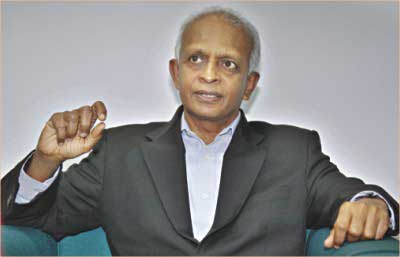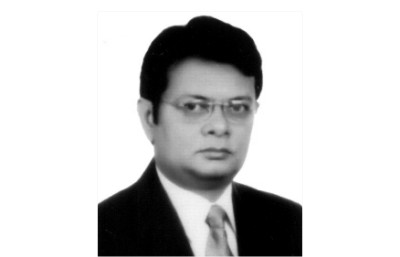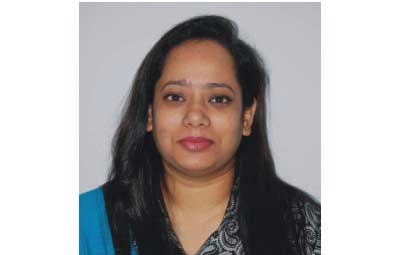Banking
Aid aplenty, but delayed The country director of Asian Development Bank stresses the need to build capacity in project implementation with donor funds

With payment pressure continuing to strain external balance, the need for a quick release of funds from the $13 billion in aid committed by donors is felt more than ever before. But two major factors -- delays in project preparation and procurement -- prolong aid disbursement by donors, especially for Asian Development Bank (ADB), said its Country Director Thevakumar Kandiah.
The Manila-based lending institution, one of the major financiers of Bangladesh, has kept $3.9 billion of funds undisbursed.
"One of main reasons as to why our portfolios are not being disbursed as quickly as it might is what we call start-up delay, project delays. This is something we have to address, going forward," said Kandiah.
Kandiah, who turns 60 today, shared his views with The Daily Star before retirement. He headed the ADB resident mission here for the past two years.
He was upbeat about the prospects of the Bangladesh economy and also talked about the government's bid to purchase power from other countries in the region and its scope to exploit the country's geographical position.
Kandiah, who was involved in direction of country partnership strategy for the next five years, hoped that Bangladesh might be able to attain its vision to become a mid-income country by 2020 by executing the plans laid out in the Sixth Five-Year Plan for 2011-2015.
To attain the economic goals, one of the main requirements is to build facilities through development programmes, he said.
Hence, an increase in the capacities of government officials is important, so that officials can prepare and implement projects in line with the guidelines and policies of donors, he added.
One of the main factors behind the delay in implementation of the development projects is a lack of capacity, which causes slow funds disbursement by donors.
"I think we have to prepare projects and get them ready in such a way that as soon as it gets approval from ADB or other donor agencies, projects should be ready for implementation," said the economics graduate from University of Wales.
Kandiah said the capacity of the ministry officials in preparing the Development Project Proforma (DPP) based on the guidelines and policies of donor agencies needs to be improved.
"The DPP approval process takes a long time. In some cases, it takes more than a year for DPP approved. Revisions of DPP also take a long time," he said.
But the delays are not just for the planning commission. Sometimes, ministry officials do not have the capacity to understand what is required to prepare or revise a proposal and send information required by the planning commission, according to Kandiah.
He recommended streamlining the practices and procedures relating to preparation and implementation of the projects.
At the same time, there is a need to train more people to execute the development programmes run by the government, to build capacity and feed the needs of a more than $100-billion economy, growing at nearly 6 percent a year, he said.
“So you need a lot more capacity," said Kandiah, citing examples from ADB's lending in the pipeline. The regional lender has doubled its funding to Bangladesh to $1.0 billion in the last five years.
“You need more people to be trained, to be educated, to know how to handle the preparation and implementation of a project," he said. "Capacity building to an extent is never over. It has to continue.”
The capacity of the executing agencies or project implementation agencies in understanding ADB guidelines, financial management guidelines, safeguard policies and environmental guidelines is also important.
Another reason for slow disbursement of funds is a delay in procurement because of the time needed to look at all the complaints from bidders who say that they have not been treated fairly in evaluation, he said.
This happens especially in large projects; sometimes, it requires going for re-bidding up to a third round, said Kandiah, citing ADB's loan portfolio in Bangladesh.
“These will have to be looked at. Our guidelines provide that all representations must be properly treated. The complaints themselves are okay, I think the process provide for it," he said.
"But in Bangladesh, we tend to get a lot of representations,” added the ADB official.
On a general note, he said there are more complaints from bidders because the evaluation process cannot be kept confidential, as it should be.
“So basically there are leaks,” said Kandiah. “So suppliers get information about something going on. And before the evaluation process is completed, they begin writing complaints."
In a way, it is good because it ensures a transparent process, allowing bidders to represent the evaluation process but at the same time, it does slow the process and delays decision, he said.
"The evaluation process should be robust, should be confidential. Confidential information should not be leaked to bidders,” said the ADB country chief, suggesting that there should be guidelines for people involved in the evaluation committee and evaluation process.
"It will, of course, solve the problems in delays in fund disbursements," he said, also expecting that a cut in the time lag will help the government manage pressure on the balance of payments (BoP).
But present challenges, such as high inflation, current account deficits and reserves under pressure, will not be easy to fix because a lot of the problems have been caused by external factors, said the ADB country head.
He said tightened credit and imports by Bangladesh Bank will help tackle the challenges. At the same time, the government needs to find ways to increase revenue, he added.
"That's not easy," he said. "Because, when you increase tariff, it has other implications because it increases inflation."
He however expected that the current problems in the economy are short-term in nature and will be solved in the coming months.
“Bangladesh has fantastic resources, resilient people and a huge domestic market. It has a very good location,” he said.
"The benefits of location are tremendous. So, if it takes advantage of its location, resources, resilient people and huge domestic market, there is a lot of potential for Bangladesh.”
But there are some challenges -- infrastructure deficit, growing urbanisation, finding the right people and skills, food security, and negative impacts of climate change are some.
These are not easy to manage, but these have to be addressed, he said.
Some of the issues such as a deficit in transportation, energy, urban development, education, the financial sector and agriculture will be addressed under the Sixth Five Year Plan, which is aligned with the Country Partnership Strategy of donors, according to Kandiah.
“Once that is done and you increase your capacity to implement projects, then I think the government goal of attaining a middle income country by 2021 can be achieved,” said Kandiah, who believes that an exciting time lies ahead for Bangladesh.
The Daily Star/Bangladesh/ 12th Jan 2012
Prime Bank's new additional MD

M Reazul Karim has recently been promoted the additional managing director of Prime Bank with effect from January 1, the bank said in a statement.
Prior to the appointment, he was the deputy managing director of the Bank. Karim started his career as a probationary officer of National Bank in 1984.
An accounting postgraduate from Dhaka University, Karim joined Prime Bank in 1995.
The Daily Star/Bangladesh/ 12th Jan 2012
New financial institutions head for Citi

Nuzhat Anwar has recently been appo-inted the head of financial institutions of Citibank, NA, Bangladesh, the bank said in a statement yesterday.
Nuzhat will be responsible for managing the bank's relationships with other bank and non-bank institutions.
Prior to the appointment, she was serving the bank as the head of product treasury and trade solutions.
A postgraduate in finance from Dhaka University and an executive degree holder from Indian Institute of Management Kolkata, India, she joined Citibank Bangladesh in 1999.
The Daily Star/Bangladesh/ 12th Jan 2012
Inflation to simmer down in Q4: BB
The Bangladesh Bank (BB) expects the soaring inflation will be stable in the coming months and come down to single-digit in the last quarter (Q4) of current financial year.
The central bank in a working paper, submitted to the parliamentary standing committee on the finance on Monday, said the inflation would start declining in the last quarter of 2011-12 fiscal year unless any domestic or external causes outclass the prospect.
"The stable and downtrend in global commodity prices will have similar impact on domestic market," BB said, hoping the trend would simmer off the rising inflation.
The central bank said the inflation had been on the rise since 2009 and hovering over 10 percent in recent months, making days uncomfortable for "fixed income group" people.
The money market regulator, however, said it would continue its efforts to bring down the inflation in line with the government's steps to control the spiralling prices of commodities.
The BB said it would continue using various tools, including repo and reverse repo rates, bank rates and buying or selling dollars, to maintain comfortable money supply to the market, which would eventually stabilise the inflation.
The banking regulator is following a monetary policy to help increase money supply to the productive sector to create more avenues for maintaining the steady supply of goods and services, which will stabilise the domestic demands and thus the inflation.
Referring to the reducing subsidy to fuel oil, power and fertilisers to ease financial burden on the government, the BB said non-food inflation would not come down "until the government completes the necessary process to lower the burden of subsidy".
The non-food inflation was 11.38 percent in December.
"The depreciation of taka against dollar also created pressure on consumer price inflation by making import costlier," the central bank said, but it observed that the depreciation also paved the way for bringing balance in exchange rate by encouraging more remittances and accelerating export growth.
The central bank said it had already withdrawn the ceiling on bank rates, which would reduce fund flow to the market by making credit costlier for many sectors.
"The high interest and limited access to liquidity will soon stabilise the exchange rate and the reserves," the BB said.
The Daily Star/Bangladesh/ 11th Jan 2012
Central bank asks FIs to submit CSR statements
Bangladesh Bank on Monday directed financial institutions (FIs) to submit their statements on corporate social responsibility and report on gender equality related performance indicators on half-yearly basis.
Department of Financial Institutions and Markets of the central bank issued a circular to the chief executives and managing directors of all FIs in this regard.
The Daily Star/Bangladesh/ 11th Jan 2012



